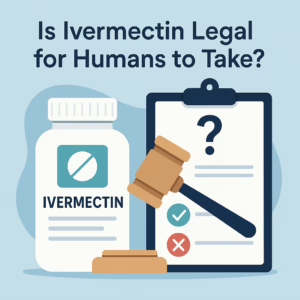Making decisions about your health can be difficult, so it’s important to have clear, reliable information available to review. You may have heard of ivermectin in the past few years, an antiparasitic medication that has been used globally for decades. Recently, ivermectin has been researched for its other potential properties, including its ability to fight viruses like COVID-19.
If you’ve ever wondered, “Should I take ivermectin?” This article will help you determine if ivermectin is right for your situation. Below, we’ll share what ivermectin is and how it can be used to improve your health.
What is Ivermectin, and How Does it Work?
Ivermectin is an antiparasitic medication that was first developed in the 1970s. This drug works by binding to proteins in parasite nervous systems, paralyzing and eventually killing them. This prevents further reproduction of these parasites in the body, fighting the infection and allowing people to heal.
Though originally created for veterinary use, researchers soon deemed it useful in treating human parasitic conditions as well. Typically, ivermectin is taken as a pill in a single dose or a short series of doses, but it can also be used as a topical treatment depending on the condition being treated.
Recently, scientists have been studying ivermectin for its ability to treat other conditions, such as viral infections. Some research suggests it has anti-inflammatory properties that can reduce swelling and irritation in the body, while others suggest it can prevent some viruses from replicating in the body. Though promising, this research is still ongoing.
Is Ivermectin Safe?
When used correctly, ivermectin is considered safe for most people. It has been used worldwide to treat various parasitic infections with few issues. However, like all medications, ivermectin has potential side effects and should not be taken beyond safe and approved dosages.
Ivermectin targets proteins in parasitic nervous systems that are not present in the human body. Because human cells have nothing for ivermectin to target, it does an excellent job of eliminating infections while largely leaving human cells alone.
This medication should only be used with a prescription from a licensed physician and following your doctor’s instructions carefully.
Most Common Uses of Ivermectin
As mentioned, ivermectin has been used worldwide for decades. Its most common use is in fighting parasitic infections. Some of the most common internal infections treated by ivermectin include:
- Strongyloidiasis: A parasitic infection caused by tiny worms that live in the intestine. This parasite causes symptoms including diarrhea, vomiting, rashes, cough, and wheezing. It typically infects people by penetrating through the skin, as it lives in infected soil, particularly in areas with poor sanitation.
- Onchocerciasis (River Blindness): River blindness is a serious disease caused by worms transmitted by blackflies, which are usually found around rivers and streams in tropical regions. It can cause rashes, itching, and eventually blindness if not treated in time.
In these diseases, ivermectin targets the larvae of these parasites, stopping them from growing and reproducing further.
Ivermectin can also treat external parasitic conditions, including:
- Scabies: Scabies is an irritating condition caused by tiny mites that burrow into the skin, causing itching and rashes. Ivermectin can be taken in pill form or a topical cream to treat severe cases that do not respond to other treatments.
- Head Lice: Head lice, one of the most common parasites that affect school children, can be effectively treated by ivermectin. It is usually used as a topical lotion that is applied directly to the scalp to kill lice and their eggs.
Other Potential Uses of Ivermectin
Though ivermectin is primarily used for parasitic infections, it also has strong potential for fighting viral and inflammatory conditions. Some early lab studies suggest that ivermectin may inhibit the replication of certain viruses, such as COVID-19. However, these studies have only been performed under laboratory conditions, and more research is needed to determine if these results would be the same when replicated in humans.
Ivermectin also has potential anti-inflammatory effects that could help reduce swelling and irritation in the body. This would alleviate discomfort in patients suffering from inflammatory diseases that don’t respond to other treatments.
Should I Take Ivermectin? Factors to Consider
You may be wondering, “Should I take ivermectin for my infection?” As with any condition, the answer depends on several factors. Since ivermectin is a prescription medication, it should only be taken under the guidance of a licensed physician who can help determine if it’s right for you. Here are some of the factors to consider before taking ivermectin for an infection.
Your Medical History
First, consider your overall health and any pre-existing conditions you may have. Some health issues could make taking ivermectin unsafe or less effective, such as:
- Liver disease
- Kidney disease
- Neurological conditions
Your liver and kidneys process and remove medications from the body, so preexisting conditions in these organs could affect how your body absorbs and handles the medication. Some people with nervous system disorders may also experience stronger side effects from ivermectin than others.
Potential Medication Interactions
Like any other medication, ivermectin can interact with other medications you already take. Ivermectin could cause unwanted side effects or be less effective when taken alongside certain medications such as blood thinners or other antiparasitics.
Specifics of Your Infection
Ivermectin is primarily used for specific parasitic infections, though it has also been used off-label for some viral infections and anti-inflammatory conditions under the guidance of a healthcare professional. Ivermectin should not be taken for bacterial infections.
Safe Usage Guidelines
If your doctor prescribes ivermectin, follow their instructions carefully. You should only take ivermectin designed for humans, not animals since these drugs are made in different ways. You should also only ever take the prescribed dose, as taking too much could cause a toxic overdose.
Final Thoughts
When deciding, “Should I take ivermectin?” there are lots of factors to consider. Though ivermectin is usually well-received for various conditions, you should always consult a medical professional before taking it for an infection. Be sure to use only high-quality ivermectin designated for humans and to follow your doctor’s dosage orders.
Looking for quality ivermectin shipped directly to your door? Shop All Family Pharma for ivermectin prescribed by a licensed physician.




